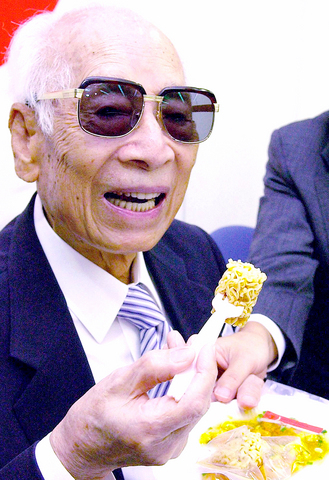Japan yesterday bade farewell to Momofuku Ando, known as the inventor of instant noodles that have become a global household product, after he died aged 96.
Ando died of acute heart failure on Friday, said Nissin Food Products Co, the company he founded in 1948 in the aftermath of World War II and built into a multi-billion dollar empire.
Japanese newspapers published lengthy obituaries of the businessman yesterday with the influential Asahi Shimbun praising him for bringing "instant noodles to the world and into space."

PHOTO: AP
The mass-circulation Yomiuri Shimbun said Ando started from scratch in developing an instant noodle which has "grown with the age of mass consumption" and added "a new chapter in the history of the world's food culture."
Born Wu Bai-fu (
After founding the precursor of Nissin, Ando put on the market "Chicken Ramen," the first instant noodle product, in 1958. The chicken-flavored dried noodle cake could be served in minutes by pouring hot water over it in a bowl.
He invented the product, which soon became a hit, at a time when his business ventures were in trouble. As managing director of a credit union that went bankrupt, he had given up his assets to cover the debt.
In his biography, Ando said he was inspired to develop the product when he saw a long line of people waiting to buy a steaming soup noodle at a black market stall in a war-ravaged city.
"Peace prevails when food suffices," he said.
Sales of Chicken Ramen rocketed after Japan's number-one general trading house Mitsubishi Corp was commissioned in 1959 to help promote the product as the country was taking off on its rapid post-war industrialization.
In 1970, Nissin established its US subsidiary, Nissin Foods (USA) Inc, and in the next year launched the "Cup Noodle," a pre-cooked slab of noodles in a waterproof styrofoam container.
Nissin has led the global instant noodle industry which sells 85.7 billion servings each year. Nissin's annual sales of instant noodles amount to 10 billion single servings in 10 countries.
Ando opened a museum of instant Ramen in Osaka in 1999 and retired from the chairman's post in 2005 to serve in an honorary role as founder-chairman.
In 2005, Nissin supplied a vacuum packed instant noodle or "Space Ram" to Japanese astronaut Soichi Noguchi aboard the US space shuttle Discovery.
"It is like a dream that people from rivaling countries can eat Ramen together in space," Ando told reporters at that time.
According to the Mainichi Shimbun, Ando was last seen in public on Wednesday when he made a New Year's speech at Nissin's head office in Osaka and had a lunch with executives, a bowl of Chicken Ramen with rice cake.

Three experts in the high technology industry have said that US President Donald Trump’s pledge to impose higher tariffs on Taiwanese semiconductors is part of an effort to force Taiwan Semiconductor Manufacturing Co (TSMC, 台積電) to the negotiating table. In a speech to Republicans on Jan. 27, Trump said he intends to impose tariffs on Taiwan to bring chip production to the US. “The incentive is going to be they’re not going to want to pay a 25, 50 or even a 100 percent tax,” he said. Darson Chiu (邱達生), an economics professor at Taichung-based Tunghai University and director-general of

‘LEGACY CHIPS’: Chinese companies have dramatically increased mature chip production capacity, but the West’s drive for secure supply chains offers a lifeline for Taiwan When Powerchip Technology Corp (力晶科技) entered a deal with the eastern Chinese city of Hefei in 2015 to set up a new chip foundry, it hoped the move would help provide better access to the promising Chinese market. However, nine years later, that Chinese foundry, Nexchip Semiconductor Corp (合晶集成), has become one of its biggest rivals in the legacy chip space, leveraging steep discounts after Beijing’s localization call forced Powerchip to give up the once-lucrative business making integrated circuits for Chinese flat panels. Nexchip is among Chinese foundries quickly winning market share in the crucial US$56.3 billion industry of so-called legacy

Hon Hai Precision Industry Co (鴻海精密) is reportedly making another pass at Nissan Motor Co, as the Japanese automaker's tie-up with Honda Motor Co falls apart. Nissan shares rose as much as 6 percent after Taiwan’s Central News Agency reported that Hon Hai chairman Young Liu (劉揚偉) instructed former Nissan executive Jun Seki to connect with French carmaker Renault SA, which holds about 36 percent of Nissan’s stock. Hon Hai, the Taiwanese iPhone-maker also known as Foxconn Technology Group (富士康科技集團), was exploring an investment or buyout of Nissan last year, but backed off in December after the Japanese carmaker penned a deal

WASHINGTON POLICY: Tariffs of 10 percent or more and other new costs are tipped to hit shipments of small parcels, cutting export growth by 1.3 percentage points The decision by US President Donald Trump to ban Chinese companies from using a US tariff loophole would hit tens of billions of dollars of trade and reduce China’s economic growth this year, according to new estimates by economists at Nomura Holdings Inc. According to Nomura’s estimates, last year companies such as Shein (希音) and PDD Holdings Inc’s (拼多多控股) Temu shipped US$46 billion of small parcels to the US to take advantage of the rule that allows items with a declared value under US$800 to enter the US tariff-free. Tariffs of 10 percent or more and other new costs would slash such